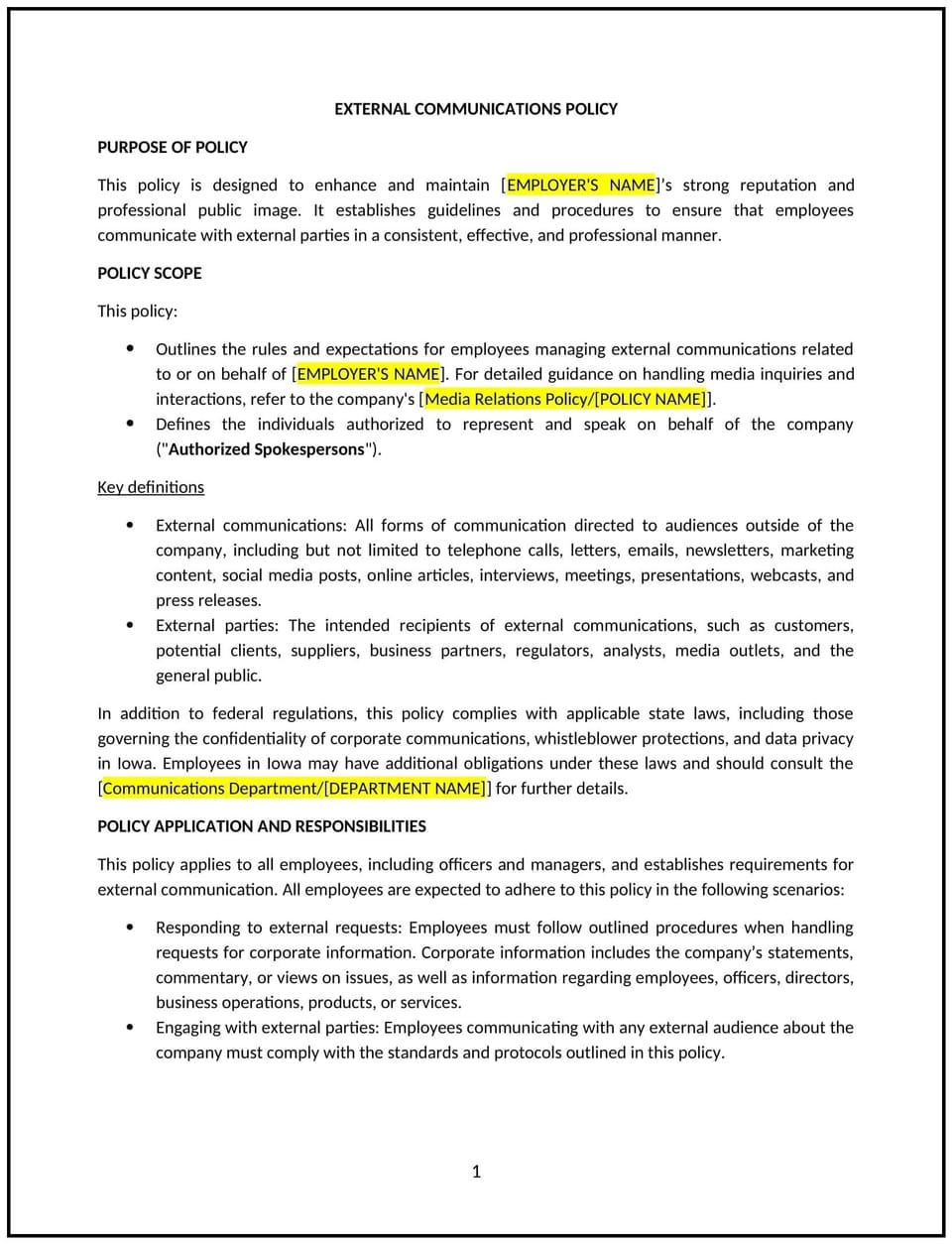External communications policy (Iowa): Free template

External communications policy (Iowa)
An external communications policy helps Iowa businesses maintain consistent, clear, and professional communication with external stakeholders, such as clients, vendors, media, and the public. This policy supports effective brand management, risk mitigation, and compliance with state-specific regulations. By establishing clear guidelines for communication, businesses can protect their reputation and foster positive relationships with external parties.
By implementing this policy, businesses in Iowa can streamline external communications, enhance brand image, and prevent potential legal or public relations issues.
How to use this external communications policy (Iowa)
- Define communication channels: Identify which platforms (e.g., email, social media, press releases) should be used for external communications.
- Assign spokespersons: Designate employees responsible for handling media inquiries and representing the company in external communications.
- Establish approval processes: Outline how messages should be reviewed and approved before distribution to ensure alignment with company values and legal requirements.
- Develop crisis communication strategies: Prepare a plan for communicating with external stakeholders during a crisis, including the messaging, timing, and methods of delivery.
- Set guidelines for social media: Provide clear rules for employees’ use of social media in relation to the company, including when and how to post about the business.
- Protect sensitive information: Outline what types of business information are confidential and should not be shared with external parties.
- Monitor external communications: Set up procedures to regularly assess the impact of external communications and address any potential issues.
Benefits of using this external communications policy (Iowa)
This policy provides several key benefits for Iowa businesses:
- Promotes consistent messaging: Ensures external communications align with the company’s values and objectives.
- Enhances brand reputation: Helps businesses maintain a professional image and positive relationships with clients, media, and the public.
- Reduces risks: Minimizes the chance of miscommunication or accidental disclosure of sensitive information.
- Improves legal protection: Offers guidelines that help businesses navigate state and federal regulations related to external communications.
- Strengthens crisis management: Provides clear procedures for managing communications during emergencies or controversies.
- Increases efficiency: Streamlines the approval process and ensures timely delivery of important messages.
Tips for using this external communications policy (Iowa)
- Regularly review and update the policy: Businesses should update the policy periodically to ensure it reflects changes in technology, business goals, and regulatory requirements.
- Provide training for employees: Businesses should offer training on best practices for external communications, including social media use and media interactions.
- Establish a feedback loop: Businesses should encourage feedback from key stakeholders to continuously improve communication strategies.
- Ensure clarity and brevity: Businesses should aim for clear, concise, and consistent messaging to avoid confusion or misinterpretation.
- Protect confidential information: Businesses should regularly remind employees of the importance of safeguarding sensitive information.
Q: Why should Iowa businesses have an external communications policy?
A: Businesses should have an external communications policy to maintain consistency, protect their reputation, and ensure compliance with state and federal regulations.
Q: Who should handle external communications?
A: Businesses should designate specific individuals, such as PR staff or senior management, to handle all external communications to ensure consistency and professionalism.
Q: What communication channels should be included in the policy?
A: Businesses should include email, social media, press releases, and other relevant communication channels that interact with external stakeholders.
Q: How should businesses handle crisis communication?
A: Businesses should develop a clear crisis communication plan, which includes pre-approved messaging, procedures for addressing the media, and strategies to manage public perception during an emergency.
Q: How can businesses protect sensitive information in external communications?
A: Businesses should define what constitutes sensitive or confidential information and provide guidelines on when and how this information should be disclosed or withheld in external communications.
Q: How often should businesses review their external communications policy?
A: Businesses should review the policy at least annually or after significant changes to the company or industry that could affect communication practices.
Q: Should businesses have guidelines for employee social media use?
A: Yes, businesses should establish clear guidelines for employees regarding the appropriate use of social media to represent the company and avoid potential conflicts or breaches of privacy.
Q: What should businesses do if an external communication mistake occurs?
A: Businesses should address the issue promptly, issue a correction if necessary, and implement measures to prevent similar mistakes in the future.
This article contains general legal information and does not contain legal advice. Cobrief is not a law firm or a substitute for an attorney or law firm. The law is complex and changes often. For legal advice, please ask a lawyer.


